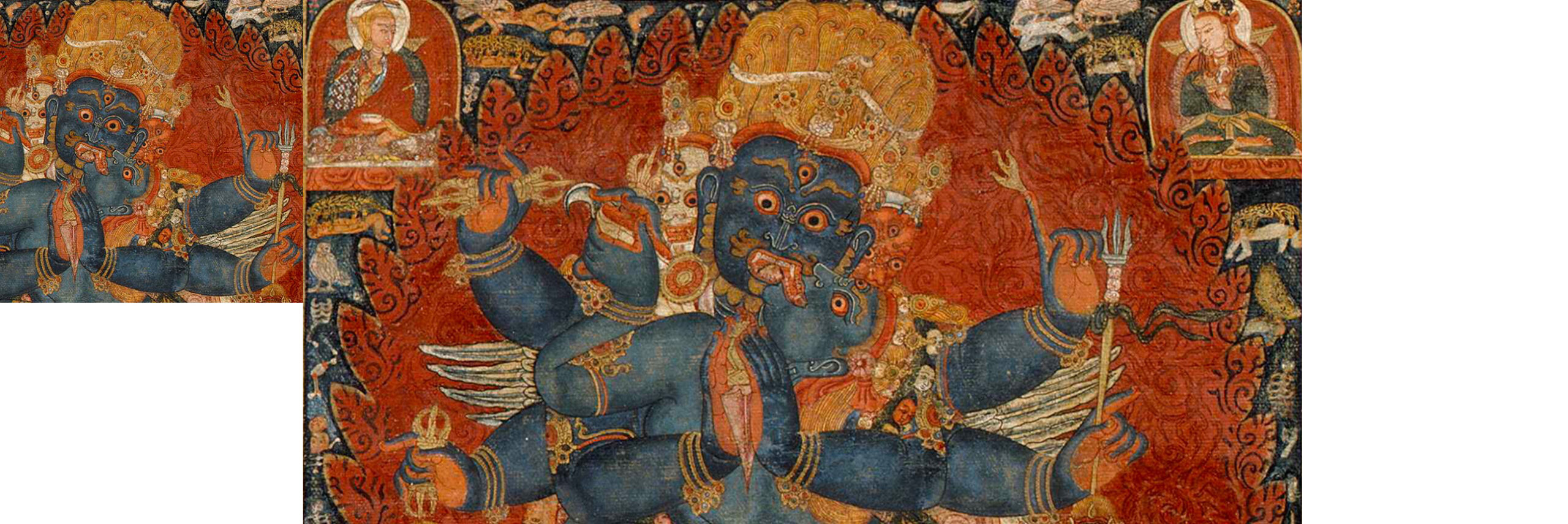
Padmasambhava and Ritual in Contemporary Practice
Padmasambhava Seminar
Monday, October 15, 2018
10:00 AM–11:30 AM
Presented by Nicolas Sihlé.
Discussants: Mona Schrempf and Liu Kuo-Wei.
Facilitator: Benjamin Bogin or Elena Pakhoutova
As the Tibetan Buddhist traditions continue to spread beyond the Himalayas and Tibetan regions to mainland China, Taiwan, and around the world, Padmasambhava’s mastery of tantric ritual is celebrated as much as his teachings. In particular, the tenth day of each lunar month is devoted to the worship of the Lotus-born Guru. This is an occasion for village communal rituals as well as key gatherings for the non-monastic specialists of tantric ritual (ngakpa).
In contemporary Bhutan, some tantric healers, called “treasure lords,” perform rites invoking the origin narratives about Padmasambhava’s powers as a healer, while lay pilgrims visit his meditation and treasure sites where they seek blessings, fertility, and healing from the Guru’s traces and relics in the natural environment. Contemporary Buddhist centers whose charismatic Tibetan teachers trace their lineages to Padmasambhava’s teachings, such as distinctive traditions from the eastern Tibetan Kham region, became prevalent in Taiwan. These networked centers engage both in meditative contemplation and ritual in new and engaging ways that invite diverse following.
Seminar tickets include admission to the Rubin’s exhibitions, including The Second Buddha: Master of Time.
Support for the seminar was provided by the Chiang Ching-Kuo Foundation for International Scholarly Exchange
About the Speakers
Nicolas Sihlé, PhD,is a social anthropologist by training (PhD Paris-Nanterre University, 2001), who first taught at the Department of Anthropology at the University of Virginia (2002″“2010) before joining the Centre for Himalayan Studies (CNRS, France). He specializes in Tibetan society and religion and in the comparative anthropology of Buddhist societies more generally. His research focuses in particular on religious specialists called tantrists (ngakpa), key figures of the non-monastic side of Tibetan Buddhism, who specialize in tantric ritual practice and are associated with rituals involving strong ritual power and ritual violence such as violent exorcisms. He has carried out extended fieldwork in the Mustang district in northern Nepal and in the Repkong district in eastern Amdo (Qinghai) since 2003. He has publishedRituels bouddhiques de pouvoir et de violence: La figure du tantriste tibétain(Buddhist Rituals of Power and Violence: The Figure of the Tibetan Tantrist) (Brepols, 2013), as well as co-edited “Towards a Comparative Anthropology of the Buddhist Gift (and Other Transfers)” (special issue ofReligion Compass, 2015) and “Toward a Comparative Anthropology of Buddhism” (special section ofReligion and Society, 2017).
Mona Schrempf, PhD, is a sociocultural anthropologist and independent researcher, with a PhD from the Free University of Berlin (2001). Her postdoctoral ethnographies concern health, illness, and healing among Tibetan and Himalayan communities in China, India, and Bhutan. As an affiliated member of the Wellcome Trust research project “Beyond Tradition: Ways of Knowing and Styles of Practice in East Asian Medicines 1000 to the Present” at EASTmedicine, University of Westminster, Schrempf undertook a multi-sited ethnography examining transnational styles of practice, formulation regimes, and therapeutic networks in globalized Tibetan medicine between China and Europe (2012″“2015, monograph forthcoming). Her publications include Medicine between Science and Religion, Explorations of Tibetan Grounds(Berghahn, 2010; paperback, 2013), Studies of Medical Pluralism in Tibetan History and Society (IITBS, 2010), Figurations of Modernity, Global and Local Representations in Comparative Perspective (Campus, 2008), and Soundings in Tibetan Medicine (Brill, 2007). She is senior co-editor of the peer-reviewed academic journal Asian Medicine: Tradition and Modernity.
Kuo-wei Liu, PhD, is an Associate Research Fellow at the National Palace Museum in Taipei, Taiwan, where he focuses on Buddhist texts. He received his PhD from Harvard University in 2001 and taught at Fo-guang University in the Department of Religious Studies (2002″“2009) and the Department of Buddhist Studies (2009″“2013).
Suggested Readings
Diemberger, H. 2007. “Padmasambhava’s Unfinished Job: The Subjugation of Local Deities as Described in the dBa’-bzhed in Light of Contemporary Practices of Spirit Possession.” In PramÄṇakÄ«rtiḥ: Papers Dedicated to Ernst Steinkellner on the Occasion of His 70th Birthday, edited by B. Kellner, et al., 85″“94. Vienna: Arbeitskreis für Tibetische und Buddhistische Studien Universität Wien.
Garrett, Frances. 2009. “Eating Letters in the Tibetan Treasure Tradition.” Journal of the International Association of Buddhist Studies 32 (1″“2): 85″“114.
Schrempf, Mona. 2015. “Spider, Soul, and Healing in Eastern Bhutan.” In From Bhakti to Bön: Festschrift for Per Kvaerne, edited by Hanna Havnevik and Charles Ramble, 481″“497. Oslo: The Institute for Comparative Research in Human Culture.
Schrempf, Mona. 2018. “From Popular Pilgrimage Festival to State Monastic Performance—The Politics of Cultural Production at Gomphu Kora, East Bhutan.” In Approaching the Sacred: Processions and Pilgrimages in Historical and Intercultural Perspectives. Berlin Studies of the Ancient World 49, 323″“359. Berlin: Edition Topoi.
Sihlé, Nicolas. 2013. Rituels bouddhiques de pouvoir et de violence: La figure du tantriste tibétain. “Bibliothèque de l’École des Hautes Études—Sciences religieuses” series, 152. Turnhout: Brepols.
Terrone, Antonio. 2008. “Tibetan Buddhism beyond the Monastery: Revelation and Identity in rNying ma Communities of Present-Day Kham.” In Images of Tibet in the 19th and 20th Centuries, edited by M. Esposito, 746″“779. Paris: École Française d’Études Orientales.
Ticket per Session: $20.00
Member Ticket per Session: $16.00
Seminar Tickets: $65.00
Seminar Member Tickets: $52.00
Seminar Student Tickets: $25.00
Have any questions? Contact the Museum Box Office at 212-620-5000 ext. 344 or email us at boxoffice@rubinmuseum.org.

